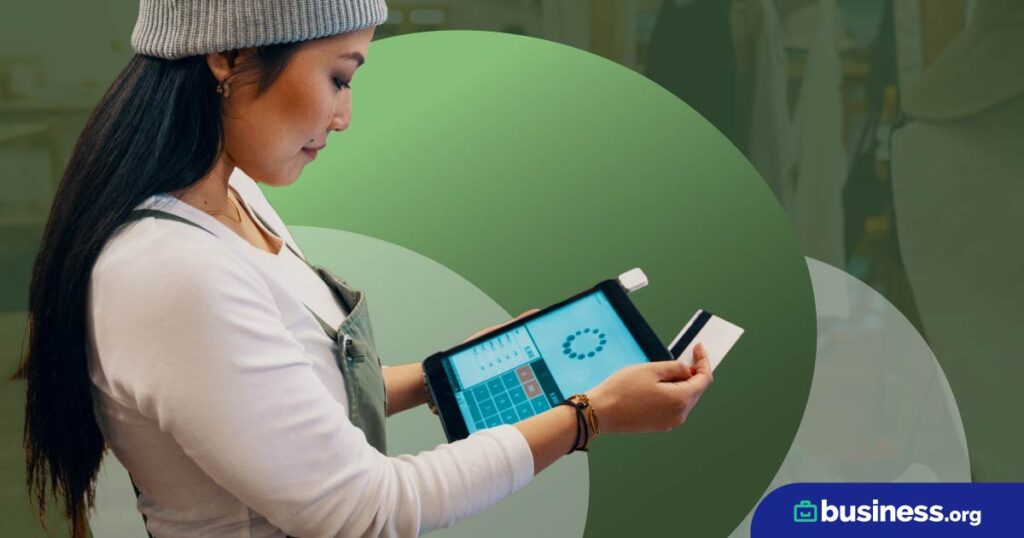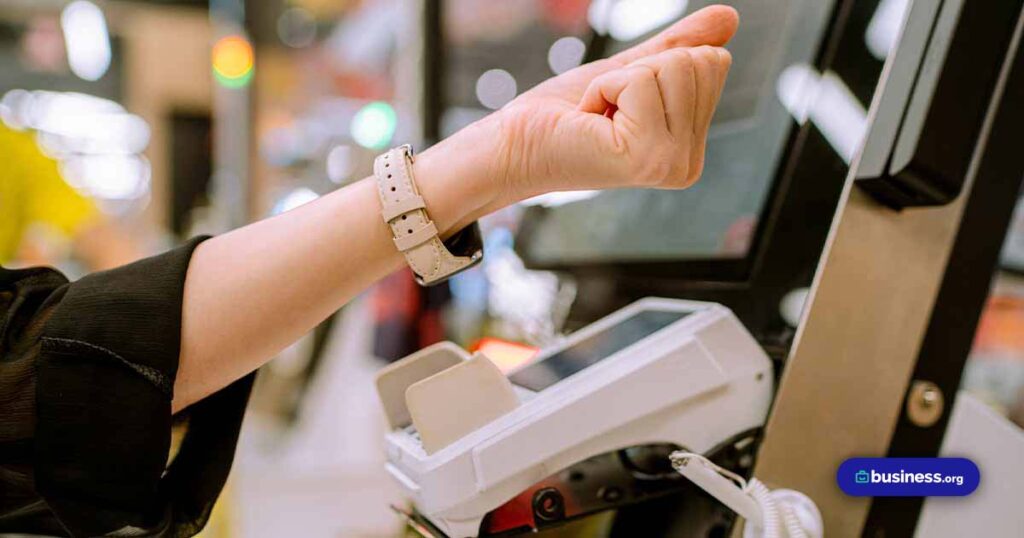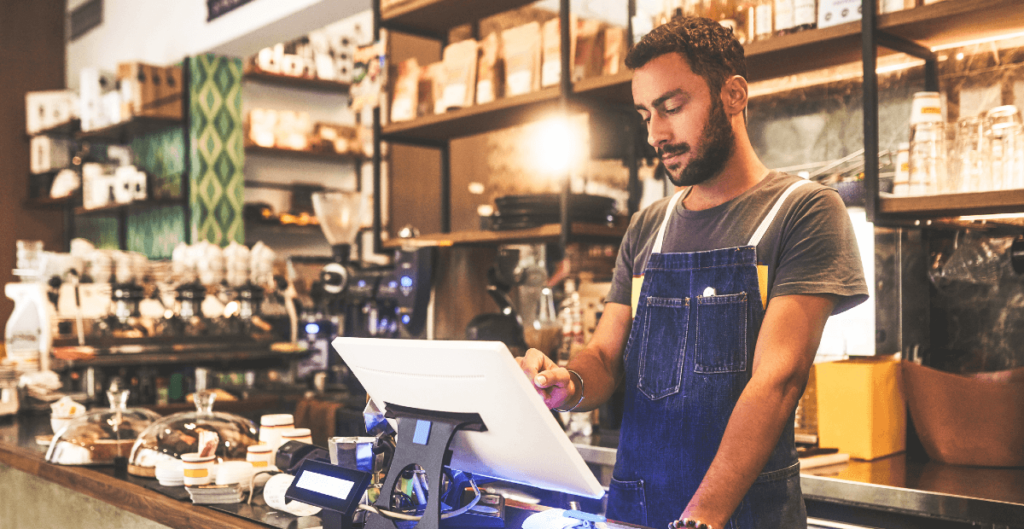We are committed to sharing unbiased reviews. Some of the links on our site are from our partners who compensate us. Read our editorial guidelines and advertising disclosure.
Comparing Your Point of Sale Software Options
Learning the ins and outs of point-of-sale (POS) software is crucial for businesses that want to maximize value. This guide is designed to help you discover and compare the software options available on modern POS systems.
Ideally, your POS software should be able to automate hundreds of monotonous daily business tasks, giving you more time to focus on your bottom line.
But before we get to the ideal POS system, let’s cover the basics.
Table of contents
What is the definition of a POS system?
A POS system—or point-of-sale system—is a software and hardware setup primarily designed to facilitate sales. Modern POS systems often perform a variety of tasks over and above sales facilitation, including marketing, inventory management, employee management, and much more.
The best POS software for your business will have the perfect balance of many useful features you need and few, if any, features you don’t need. For example, if you’re running a retail operation, you shouldn’t invest in a POS system with lots of restaurant optimization tools.
So what kinds of software packages can you expect in modern POS systems? Let’s look at the top POS packages on the market today.
By signing up I agree to the Terms of Use and Privacy Policy.
Types of POS systems
Most POS sellers design their products around particular industries. The most common high-level types of POS systems are as follows:
- Customizable small-business-focused POS systems
- Restaurant POS systems
- Retail POS systems
- Golf POS systems
- Dispensary POS systems
- High-risk POS systems
These POS system types each have their own unique set of specialized features. We’ll dive into each of these POS types in detail, looking into how they can improve your business operations.
Customizable small-business-focused POS systems
These sorts of systems are designed to expand and contract based on user needs. Two examples of this type of POS system are Square and Shopify.
Flexibility is particularly important for small businesses. In lean months, it’s crucial to have the option of cutting back on costs. Similarly, when business is booming, a little extra automation from a POS system can really take a load off and accelerate growth.
The basic plan offerings of these POS systems usually include a low monthly fee, comparatively expensive processing fees, and a broad array of feature options.
This overabundance of features would normally be a problem, but because you’re not paying a monthly fee, the use of extra features is entirely up to your business discretion. You don’t have to feel like you’re missing out, for example, if you don’t use the POS system’s gift card tools.
We recommend this POS type for first-time users because there are no overhead costs and a lot of ways to expand.
Restaurant POS system
What makes a restaurant POS system truly modern is its ability to run your restaurant without you having to do almost anything. Upserve and Toast are two examples of modern restaurant POS systems.
In the restaurant POS game, systems are often designed around specific types of food-service businesses:
- Full-service restaurant
- Counter-service restaurant
- Food truck
- Bar
- Venue with a bar
It’s important to pick a restaurant POS system designed around your specific food-service needs.
In a full-service restaurant system like Upserve, for example, your POS system will come packaged with features like a kitchen display system, a menu intelligence tool, a table management program, and accounting automation. These features are overkill if you just need to swipe credit cards in your food truck.
Top-of-the-line restaurant POS systems can do restaurant tasks like managing deliveries, keeping track of server performance, automatically ordering new ingredients when stock is low, and so much more.
If you need something automated in your restaurant, chances are there’s a POS system that can do it.
Retail POS system
With retail POS, inventory management is a huge consideration. Most retail POS systems are designed with lots of inventory tools including inventory tracking, automatic ordering when stock is low, and multi-store inventory tools. Both Shopify and Lightspeed are retail POS systems with lots of inventory options.
In fact, the best retail systems sync all your available inventory so that customers can buy any item you have in stock at any location no matter where they shop. If customers shop online, for example, they can use both in-store and warehouse inventories seamlessly.
In addition to inventory tools, retail POS systems are also built with ecommerce in mind. Many shoppers make a large percentage of their purchases online, so finding a retail POS with lots of online capabilities is crucial.
Some POS systems make it easy to build an online store or add your wares to online selling platforms like Etsy or Amazon.
Golf, dispensary, and high-risk POS systemsGolf, dispensary, and high-risk POS systems
We grouped these three together because they’re all specialty systems. Each of these industries has its own unique POS providers:
- Lightspeed is a great POS system for golf courses
- Flowhub and AccuPOS are great cannabis POS systems
- Dharma and Payline Data are great high-risk processors
Each of these specialty POS systems addresses industry-specific needs. Golf course POS systems, for example, need to manage tee times, proshops, and on-site restaurants. Dispensaries need specific access to medical records and other important legal compliances.
So if you’re in a specialty industry, be sure to look and see if there’s a hyper-focused POS offering built around your business model.
POS hardware
Hardware is a hugely important consideration when it comes to getting the most out of your POS software. You may have the fastest credit card processor in the world, but if your customers can’t scan barcodes with a barcode scanner, it’ll do you no good.
There are four main types of POS hardware:
- Standard mobile POS
- Smart mobile POS
- Standard terminal POS
- Smart terminal POS
The difference between a standard and smart system is simple: a standard POS system is designed to take basic payments. A smart POS system is designed with a lot of extra bells and whistles in mind.
Sometimes all you need is a device to take cards—maybe you’re a contractor or you’re doing a temporary pop-up shop. But other times you need lots of bells and whistles—think full service restaurant or multi-location retail operation.
Some hardware utilizes personal smart devices like phones and tablets. Other hardware is a standalone unit. What you need to get out of your software will largely determine the hardware you need. So be sure to figure out your software needs before you start looking into hardware.

Square is the best free point-of-sale system on the market. From invoicing to inventory tracking, Square gives you all the features you need to boost your POS experience.
The takeaway
Hopefully you have a much better sense of the options available to you in the modern POS market. Ideally, you’ll find a system that exceeds your needs and makes managing your business easier.
Not all POS systems are created equal, though, so be sure to do your homework on pricing and the experience of other users. Sometimes systems can be buggy or unexpectedly expensive.
We have tons of POS reviews here on Business.org. Our top POS system article is a great place to start.
Related content
Disclaimer
At Business.org, our research is meant to offer general product and service recommendations. We don't guarantee that our suggestions will work best for each individual or business, so consider your unique needs when choosing products and services.



